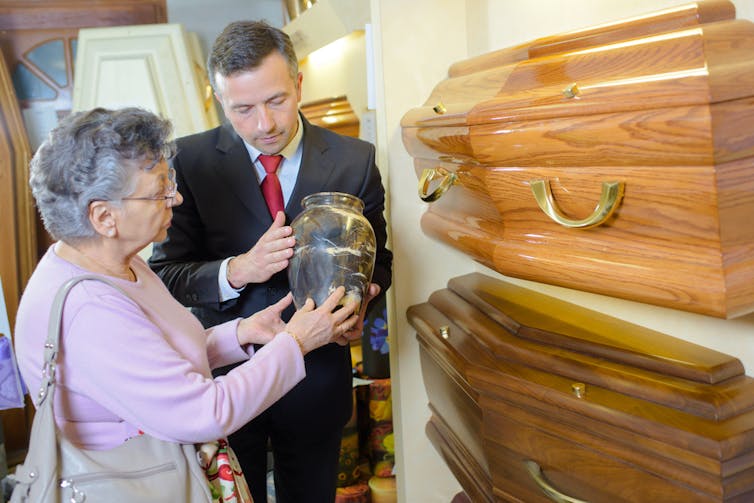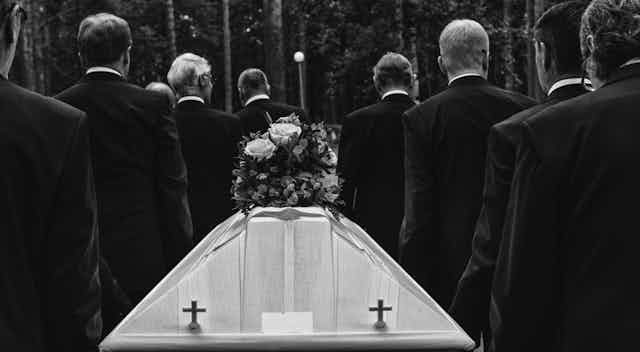The average cost of a funeral has been steadily rising in the UK for nearly two decades and now amounts to £4,184. In 2017, prompted by concerns about the lack of transparency around funeral costs, the UK government tasked its Competition and Markets’ Authority (CMA) with conducting an investigation into the funeral industry in England and Wales. In 2020 its findings led to funeral directors being required to clearly state their pricing.
But what happens when people can’t afford to pay for funeral costs – or the deceased person has no traceable family or close friends, or their family cannot, or will not pay for the funeral due to estrangement or other reasons?
When this happens, the local authority is required to organise what is called a public health funeral under the Public Health (Control of Disease) Act 1984 in England and Wales and the National Assistance Act 1948 in Scotland.
Once commonly referred to as a “pauper’s funeral”, a public health funeral is the ultimate safety net when someone dies. There is no legal requirement for a local authority to organise a funeral service alongside the body’s disposal, although most do, typically with a very simple service.
After the CMA investigation led the UK government to issue good practice guidance on public health funerals for England and Wales in 2020, the service providing for those most in need was finally receiving the scrutiny it warranted. But now a new study by anti-poverty charity Quaker Social Action has suggested that provision for public health funerals has not improved, and that for those in need, state support for a funeral is patchy at best and unlawful at worst.
Valuing all lives
Its Down to Earth study found that some local authorities are not carrying out their legal duties when it comes to the provision of public health funerals. Contrary to the government’s guidance, only 26 of the 40 local authorities surveyed held information online for people needing a public health funeral. Half had no contact details, and a third contained inaccurate or misleading information about the circumstances in which a local authority is legally required to take responsibility.
Information provision also appeared to be poor: when contacting the 27 authorities with no information online or contact details, researchers managed to reach the right department in just 15 cases, only to then be turned away by 10 of them. In six cases they were told that referrals could only be made through a coroner or hospital, and in four cases that the local authority would only help if there was no surviving family. But this is not the case and is misleading. So what does this mean and why does it matter?
In a country with an advanced economy and a welfare state like the UK, provision for public health funerals is a very public indicator of the way a state values its citizens, particularly those most in need – the disenfranchised, the disadvantaged, and the impoverished.
Down to Earth’s study shows that not only are local authorities not upholding their statutory duties when it comes to organising public health funerals, they are potentially making it more difficult for bereaved families at a desperate time by providing poor, inaccurate or misleading information.
As my previous research has found, it also suggests that the state is relying on assumptions about family and obligation, in the belief that relatives will unquestioningly step up to make funeral arrangements and take on the costs after someone has died.

Fit for purpose?
Public health funerals exist at the intersection of the state and the family. Why they are needed and provided reveals much about contemporary expectations, duties and responsibilities of both the state and families. Down to Earth’s study showing the variation in practice, policy and support across the country indicates that there is much more to be done to ensure that they are fit for purpose.
If local authorities – the custodians of public health funerals – cannot be relied upon to uphold their legal obligations or provide consistent and clear information at potentially one of the most difficult times of someone’s life, something is clearly going wrong.
It is hard to fathom what it might feel like to not be able to afford a funeral and to turn to the local authority for help, only to find the service wanting. Clearly local authorities need to up their game to ensure that they are fulfilling their statutory obligations and helping bereaved people in their hour of need.
But given how much families are changing, and how this may impact a family member’s sense of duty to another member, it may also be the time to review the legal grounds on which a public health funeral can be requested. Can it continue to be acceptable for someone to refuse to pay for the funeral of a relative if they have the funds?
To understand whether it may be possible to introduce legal requirements, we need to look beyond the UK to understand how things are done in Europe and the rest of the world, where attitudes to familial duty and the role of the state in organising and paying for funerals may be quite different.

